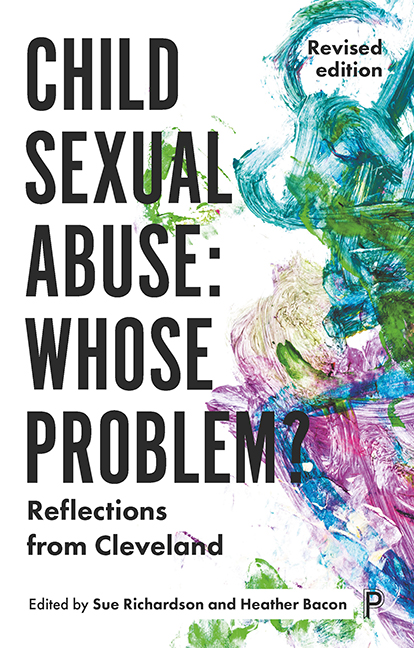Book contents
- Frontmatter
- Dedication
- Contents
- List of tables and figures
- List of abbreviations
- Notes on the editors and contributors
- Acknowledgements
- Preface
- Introduction:Why Cleveland still matters: connections with a new era
- one From Colwell to Cleveland: 1973 to 1988
- two A framework of belief
- three The medical diagnosis of child sexual abuse: the paediatrician’s dilemma
- four After the medical diagnosis: everyone’s dilemma
- five The continuum of disclosure
- six Seen but not heard: the children of Cleveland
- seven The unwanted message: child protection through community awareness
- eight Questions not answers: progressing the debate
- Conclusion:Thirty years later: how far have we progressed?
- Appendix
- References
- Index
Preface
Published online by Cambridge University Press: 13 April 2022
- Frontmatter
- Dedication
- Contents
- List of tables and figures
- List of abbreviations
- Notes on the editors and contributors
- Acknowledgements
- Preface
- Introduction:Why Cleveland still matters: connections with a new era
- one From Colwell to Cleveland: 1973 to 1988
- two A framework of belief
- three The medical diagnosis of child sexual abuse: the paediatrician’s dilemma
- four After the medical diagnosis: everyone’s dilemma
- five The continuum of disclosure
- six Seen but not heard: the children of Cleveland
- seven The unwanted message: child protection through community awareness
- eight Questions not answers: progressing the debate
- Conclusion:Thirty years later: how far have we progressed?
- Appendix
- References
- Index
Summary
There are stories no one wants to tell, because they are stories everyone wants to deny are true. And yet, the integrity of life compels one to give testimony as another bears witness to the truth. (McCall, 2010)
Since we produced the first edition of this book in 1991 we have had to accept that the struggle we are engaged in, to achieve recognition of the reality and extent of child sexual abuse in our society, is a marathon rather than a relay race where we could pass on the baton. The key to survival for those in the forefront of the struggle is to maintain hope. We can be strengthened in this arduous task by sharing and evaluating our experiences with others in a climate of openness. This was rarely our experience as professionals in Cleveland. Child sexual abuse is a problem which depends on silence and secrecy. We experienced something akin to abused children when they attempt to speak: disbelief, rejection and silencing. With this 2nd edition we continue to break that silence and invite open debate.
One of the defining characteristics of Cleveland was that developments in medical diagnosis led to children being identified as allegedly abused at a pre-disclosure stage. Some of these children were very young and depended on an adult to have the courage and conviction to act as their advocate. We are proud to have acted in this capacity. However, we recognize the limitations in practice, procedures and knowledge which existed at that time. We see our subsequent learning and experience not as the tragedy that it has been popularly depicted as, but as a precious gift of knowledge which marks a new phase of awareness and development.
Many references to Cleveland have been made in other texts, without benefit of access to the essential data of case material. The post-Cleveland analysis of the process of case management and inter-disciplinary conflict has therefore been divorced from content. Because of our professional isolation and (or) silencing by our legal advisers and employers, these two essential aspects of a full understanding have not been brought together.
Unlike child abuse itself, open discussion of the problem is a relatively new phenomenon.
- Type
- Chapter
- Information
- Child Sexual Abuse: Whose Problem?Reflections from Cleveland (Revised edition), pp. xi - xiiPublisher: Bristol University PressPrint publication year: 2018



